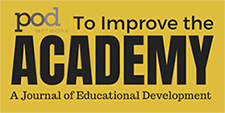Professional and Organizational Development Network in Higher Education

To Improve the Academy: A Journal of Educational Development
ORCID IDs
Pilny 0000-0001-5728-6220
Laggini Fiore 0000-0002-8662-5487
Date of this Version
Fall 2023
Document Type
Article
Citation
To Improve the Academy: A Journal of Educational Development (2023) 42(2) 11
doi: 10.3998/tia.3374
Abstract
In times of crises, educational developers (EDs) work to ameliorate the teaching- and learning-related impacts caused by campus-wide disruptions such as health-related emergencies, mass shootings, and environmental disasters. These incidents may impact the personal-psychological factors and processes of EDs that, in turn, influence their engagement with team members and faculty. Given the vital role EDs play in improving faculty teaching and student learning across higher education (Dawson et al., 2010; Grupp, 2014; Schroeder et al., 2010), understanding the impacts of campus-wide disruptions on their functioning is critical. The present, novel study uses a psychological-phenomenological methodology and the Dynamic Systems Model of Role Identity (DSMRI; Kaplan and Garner, 2017) as a guiding theoretical framework to examine how a major disruption impacted the sense of self and engagement of EDs (n = 6) who hold different specialties (that is, pedagogy or educational technology) and work in an educational development center housed within a large research institution. Participants completed three, open-ended survey questionnaires focused on their perceptions and actions before and during the COVID-19 disruption to institutional operation. Using the DSMRI Analysis Guide and Codebook (Kaplan and Garner, n.d.), five themes emerged from the data. These themes were used to address primary research questions and inform future directions and implications for theory, research, and practice.
Included in
Curriculum and Instruction Commons, Higher Education Commons, Higher Education Administration Commons, Higher Education and Teaching Commons, Other Education Commons


Comments
License: CC BY-NC-ND